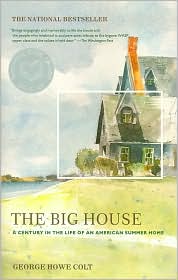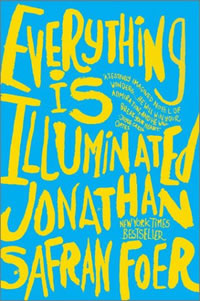 The Big House: A Century in the Life of an American Summer Home, by George Howe Colt
The Big House: A Century in the Life of an American Summer Home, by George Howe Colt"This work of non-fiction definitely reads like non-fiction, but the story is just too amazing to put aside. The author decides to write a memoir when he is spending the last summer at The Big House before the family has to sell it. The stories he weaves together are all of his family's history linked to this summer home on the Cape. There are some dry chapters dedicated to the history of the Massachusetts area, but all in all you want to keep reading this fantastic family history of the Colt family. Having a regular place where I spend my summers, it linked me to the memoir even more. It recalls a once traditional way of life that is now drifting away to new things. I would recommend it to anyone with or without a summer place that can stand to pull through the non-fiction aspect of this piece of work."
[Facebook's "Still Reading (Summer 2008)"]
George Howe Colt, his wife and his daughter, are all heading to their family place on the Cape for one final visit before the house must be sold. While spending his last summer at the place where the majority of his childhood memories took place, the author tells readers not only about his life at The Big House, but also his entire family history that is wrapped up in the home. From the time it is built, to the constant renovations, to its final selling and the effort to repurchase it, Howe weaves an emotional ride. His tale involves family secrets uncovered through hard investigation, love affairs, madness, but also covers all of the things you would expect at a summer home such as sail boat races and tennis tournaments. It is interesting to learn about his family and notice how the traditional values and ways of life change over time. What used to be formal dinners and routines is now a bunch of crinkled fish tracings in the barn and a cracked tennis court. There are so many fascinating stories that I loved hearing about the previous Colt generations leading up to the author's own time spent at The Big House.
Yes, this piece is non-fiction, which means that there are some chapters devoted to the history of the area, mainly focusing on other houses built, and other historical families or events. I would say that the chapter about money was a downright bore, but the entire piece combined to leave you feeling like you got to know this family. Non-fiction does not mean that it reads like a history or chemistry textbook, it just means that it is more focused on story-telling than dialogue and complex character development. And Colt's writing is just as good to get the reader going and involved. There is a beautiful part near the end where the author spends the last night in the house alone during a hurricane that moved me, maybe not to tears, but definitely to moist, glossy eyes.
I think the fact that a writer can wrap up the majority of his family history by relating it back to a single object, a house, is enough to make me recommend this book. I do have a place I go to during the summer and I could totally relate to this book. The first few pages I read in the book store totally hooked me in because I knew exactly what he was talking about. However, even if you don't regularly visit a summer place, I would still recommend this book, either to find out what you are missing, or just to learn about the amazing generations of the Colt family and everything they have been through over time. It's a good read to be recommended to the right type of reader or summer home aficionado.
“When you sell a man a book you don't sell him just 12 ounces of paper and ink and glue - you sell him a whole new life.”
- Christopher Morley

